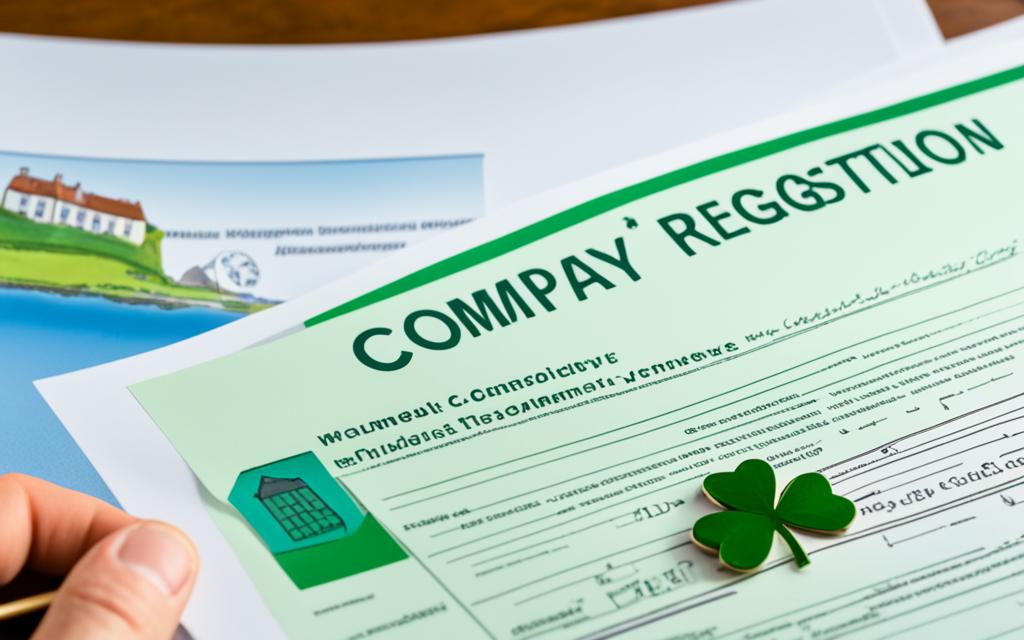Welcome to our comprehensive guide on setting up a company in Ireland and successfully launching your business in the vibrant Irish market. Whether you’re a local entrepreneur or looking to expand your business from abroad, Ireland offers a wealth of opportunities with its business-friendly environment and strategic location within the European Union.
Setting up a company in Ireland can be a rewarding venture, but it’s important to navigate the process correctly to ensure a smooth entry into the market. In this guide, we will walk you through the essential steps and considerations involved in establishing your presence in Ireland, providing you with the knowledge and confidence to make informed decisions.
From understanding different company structures to registering your company with the Companies Registration Office, we will cover every aspect of the setup process. We’ll also touch on the legal and tax obligations you’ll need to meet, as well as the importance of setting up a business bank account and acquiring a physical business address.
Once you have your company up and running, we’ll discuss post-setup considerations and the resources available to support your business growth. Whether it’s obtaining the necessary licenses, permits, or certifications for your industry or accessing business support services and networking opportunities, we’ll ensure you’re well-equipped to thrive in the Irish market.
So, if you’re ready to embark on your entrepreneurial journey in Ireland, let’s dive into the guide and discover the steps you need to take to set up a company and successfully launch your business in the Irish market.
Why Expand to Ireland?
Are you considering expanding your business to new horizons? Look no further than Ireland. With its thriving business environment and numerous advantages, Ireland offers a prime opportunity for companies seeking growth and success.
1. Favorable Business Environment
Ireland boasts a highly favorable business environment that is conducive to growth. With a stable economy, strong legal framework, and supportive government policies, businesses can thrive and flourish in this welcoming and dynamic setting.
2. EU Membership
One of the key benefits of expanding to Ireland is its membership in the European Union (EU). This provides businesses with access to a vast market of over 500 million consumers, allowing for seamless trade and expansion within the EU.
3. Highly Skilled Workforce
Ireland is renowned for its highly skilled and educated workforce. With a reputation for excellence in the fields of technology, finance, and pharmaceuticals, businesses can tap into a pool of talent equipped with the knowledge and expertise needed to drive innovation and success.
4. Growth Opportunities
Ireland offers abundant growth opportunities across various sectors. From multinational corporations to startups, businesses can benefit from a supportive ecosystem that fosters innovation, collaboration, and entrepreneurship.
Understanding Irish Company Structures
When setting up a company in Ireland, it is crucial to understand the different company structures available. Each structure has its own advantages and requirements, and choosing the right one is essential for the success and long-term sustainability of your business.
Private Limited Companies (LTD)
A private limited company, or LTD, is the most common type of company structure in Ireland. It offers limited liability to its shareholders, meaning their personal assets are protected in case of business debts or liabilities. Additionally, this structure provides flexibility in terms of ownership and transfer of shares.
Setting up an LTD requires a minimum of one director and one shareholder. The director can also act as a shareholder. The company must have a registered office in Ireland and file annual financial statements with the Companies Registration Office.
Partnerships
Partnerships are suitable for businesses jointly owned by two or more individuals. There are two main types of partnerships: general partnerships and limited partnerships.
In a general partnership, all partners have equal liability and responsibility for the business. They share the profits, losses, and decision-making equally. On the other hand, limited partnerships consist of general partners and limited partners. General partners have unlimited liability, while limited partners have limited liability and are not actively involved in the business’s day-to-day operations.
Sole Proprietorships
A sole proprietorship is the simplest and most straightforward type of company structure. It is owned and operated by a single individual who has full control and responsibility for the business. As a sole proprietor, you are personally liable for all business obligations, including debts and legal claims.
To establish a sole proprietorship, you need to register for income tax with the Revenue Commissioners and fulfill any specific requirements or permits applicable to your industry.
Understanding the different company structures available in Ireland is crucial when establishing your business. It’s important to weigh the advantages and requirements of each structure, considering factors such as personal liability, ownership flexibility, and business operations. By choosing the right structure, you can lay a solid foundation for your Irish business venture.
Registering Your Company in Ireland
Registering a company in Ireland is a crucial step towards establishing your business presence in this thriving market. Here, we will guide you through the necessary steps and requirements to ensure a smooth registration process.
1. Choosing a Company Name
The first step in registering your company in Ireland is selecting a unique and suitable company name. It’s important to choose a name that aligns with your business objectives and complies with the naming conventions set by the Companies Registration Office (CRO).
2. Preparing Company Documents
Once you have chosen a name, you will need to prepare the necessary company documents. This typically includes drafting the company’s memorandum and articles of association, which outline its purpose, structure, and rules of operation. It is advisable to seek legal advice to ensure compliance with Irish company law.
3. Submitting Forms to the CRO
Next, you will need to complete and submit the relevant forms to the Companies Registration Office. The main form is Form A1, which provides details about the company, its directors, shareholders, and registered office address. Along with Form A1, you may also need to submit additional forms depending on the company type and structure.
4. Specific Requirements and Regulations
In addition to the general registration process, certain types of businesses may have specific requirements or regulations to comply with. For example, if you are establishing a financial services company, you may need to obtain a license from the Central Bank of Ireland. It is essential to research and understand any industry-specific regulations that may apply to your business.
Once you have completed the registration process and submitted all necessary documents, the CRO will review your application. Upon successful approval, you will receive a Certificate of Incorporation, officially recognizing your company as a legal entity.
Registering your company in Ireland opens up a world of opportunities in the Irish market. Take the necessary steps to establish a strong and compliant business presence, and unlock the potential for growth and success.
Meeting Legal and Tax Obligations
When starting a business in Ireland, it is crucial to understand and comply with the legal and tax obligations that come with running a company. By meeting these obligations, you can ensure that your business operates within the bounds of the law and avoids unnecessary penalties or legal issues.
1. Employment Law
As an employer in Ireland, you have certain legal obligations towards your employees. This includes providing them with a safe working environment, adhering to fair employment practices, and complying with relevant employment legislation. It is essential to familiarize yourself with employment regulations and ensure that you meet all necessary requirements.
2. Data Protection
Data protection laws govern the collection, processing, and storage of personal data. If your business handles personal information, you must comply with the General Data Protection Regulation (GDPR) and the Data Protection Act. This involves safeguarding customer data, obtaining consent for data processing, and implementing appropriate security measures to prevent data breaches.
3. Accounting Requirements
Proper financial record-keeping is essential for every business. In Ireland, companies are required to maintain accurate accounting records and prepare annual financial statements in accordance with the Companies Act. It is advisable to engage the services of a qualified accountant to ensure compliance with accounting standards and regulations.
4. Corporate Tax Obligations
Businesses operating in Ireland are subject to corporate tax on their profits. It is important to understand the tax obligations specific to your company structure and industry. This includes registering for taxes, filing tax returns, and paying the appropriate amount of tax within the given deadlines. Seeking professional advice from tax specialists can help ensure compliance and optimize your tax position.
To summarize, meeting legal and tax obligations is an essential part of running a business in Ireland. By understanding and adhering to employment laws, data protection regulations, accounting requirements, and corporate tax obligations, you can establish a solid legal foundation for your business and avoid potential pitfalls along the way.
Setting up a Bank Account and Business Address
-
To establish a successful business presence in Ireland, it is essential to set up a business bank account. This allows you to easily manage your finances, receive payments from customers, and pay your suppliers. When opening a bank account, you will typically need to provide certain documentation, such as proof of identification, proof of address, and details about your business. Remember to inquire about any specific requirements that your chosen bank may have.
-
Having a physical business address in Ireland not only adds credibility to your company but also ensures that you can receive important mail and legal documents reliably. It is particularly important if your business requires you to have a registered office address. You can rent office space or use a virtual office service, which provides you with a prestigious business address without the necessity of physical occupancy.
-
Remember, when selecting a business address, consider its location in relation to your target customers or industry hubs. A strategic address can help establish your company’s presence and facilitate networking opportunities.
By setting up a bank account and acquiring a business address, you position your company for smooth operations and professional representation within the Irish business landscape.
Post-Setup Considerations and Support
After successfully setting up your company in Ireland, there are important post-setup considerations that you need to address to ensure compliance and maximize your business’s success. One crucial aspect is obtaining the necessary licenses, permits, or certifications specific to your industry. This ensures that you meet all legal requirements and can operate smoothly within the Irish market.
Fortunately, Ireland offers a range of business support services that are designed to assist companies in their growth journey. These services provide invaluable guidance and expertise in areas such as financing, market research, and strategic planning. Engaging with business support organizations can help you navigate potential challenges and leverage opportunities to accelerate your business’s growth.
In addition to support services, networking opportunities play a crucial role in establishing and expanding your business in Ireland. Attending industry-specific events, joining business associations, and participating in trade shows allow you to connect with like-minded professionals, potential partners, and customers. Building a strong network within your industry facilitates collaboration, knowledge sharing, and opens doors to new business opportunities.
Lastly, as an entrepreneur in Ireland, you can access various resources aimed at supporting businesses. These resources include online platforms, government programs, and business development initiatives. They provide valuable information, training, and access to funding options. Utilizing these resources can give you a competitive edge and enable your business to thrive in the dynamic Irish market.

















